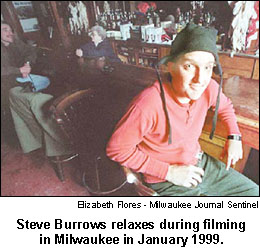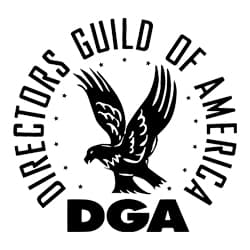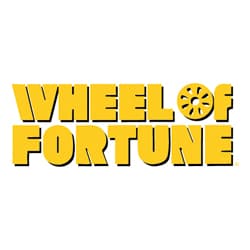Tom Alesia Wisconsin State Journal
 Onstage at the ornate Oriental Theatre, Steve Burrows savors this moment, however bittersweet, on this shivery November night. The 1,100-seat Oriental has sold out twice since the movie palace’s 1987 renovation: its grand reopening and, now, for Burrows’ Wisconsin-filmed comedy.
Onstage at the ornate Oriental Theatre, Steve Burrows savors this moment, however bittersweet, on this shivery November night. The 1,100-seat Oriental has sold out twice since the movie palace’s 1987 renovation: its grand reopening and, now, for Burrows’ Wisconsin-filmed comedy.
A UW-Madison grad and Milwaukee-area native, Burrows introduces “Chump Change,” which he wrote and directed. He’s also the star.
The next 88 minutes unfold as they have at festival and private screenings from Madison to Los Angeles to a Sundance Film Festival spinoff to Phoenix to Aspen, Colo., to New York.
 The audience always laughs. A lot.
The audience always laughs. A lot.
Miramax bought the film’s rights in March 2001, and it appeared “Chump Change” would become the state’s first homegrown film hit. Maybe earn a sliver of that post-“Big Fat Wedding” profit cake.
Instead, tonight marks the end of Burrows’ near-six-year battle through a show-business maze covered with trap doors.
When Burrows returns to the stage after the Milwaukee International Film Festival’s screening, he’s asked when “Chump Change” will “go wide.” That’s industry parlance for a film’s release schedule.
The short answer: It won’t.
“Chump Change” will go straight to DVD on January 20, 2004.
The film was too risky to make profits on a national theatrical release, despite delivering more laughs than all current megaplex comedies combined, critics agree.
“It’s too independent to be mainstream,” a Miramax official told a stunned Burrows last September, “and too mainstream to be independent.”
“(From) Milwaukee, huh,” the Los Angeles agent says trying to relate to an aspiring actor. “I love Minnesota.”
– From “Chump Change”
In “Chump Change,” Burrows plays the character “Milwaukee Steve,” who earns minor fame starring in a jock-itch commercial. When his acting career stalls, he appears on “Wheel of Fortune” and plays the game terribly. (He asks a “Wheel” producer during a break if he could buy a “y.”)
An acclaimed Wisconsin comedy film got bough by Miramax and never received a theatrical release. In January it goes to DVD. What happened with ‘Chump Change’?
He then makes a short film about his “Wheel” experience called “Soldier of Fortune,” which becomes a film-festival circuit hit. That’s when “Wheel” guru Merv Griffin threatens to sue him, preventing any more screenings, and, inadvertently, turns “Milwaukee Steve” into a sought-after screenwriter. A major studio hires him to write a script, which takes him one year to finish and is never made.
All of this actually happened to Burrows.
With artistic license used liberally, Burrows calls “Chump Change” “98 percent true.” During the opening credits, for instance, the footage is real when Burrows’ voiceover describes his father’s act playing “Autumn Leaves” with a bow and a saw on “The Gong Show.”
“I was 13 at the time,” Burrows says from his Los Angeles home. “It was 1976. ‘The Gong Show’ was the thing. My aunt in Florida had filmed it off the TV with a Super 8 camera. When I made ‘Chump Change,’ it took her six months to find but I got a 3-minute reel of that show with sound.”
A 1980 Greendale High School graduate, Burrows attended UW-Madison, where he studied political science. In the summer of 1984, needing one class to graduate, he took an acting course. Before that, he had no performing experience. His part-time job was at the former Madison Plasma Center off State Street.
Burrows, a natural comic, moved to Chicago in 1985 and landed a spot with ex-Second City artistic director Del Close’s improv troupe. For four years, Burrows mixed onstage roles with daytime production duties, including work with Sean Connery, who screamed at Burrows for cueing the Scottish actor too early during a rainy scene in “The Untouchables.”
Connery later patted Burrows on the back and said, “Oh, don’t worry, old chap. We all (expletive) up.”
Burrows moved with his wife, Margo, to Los Angeles in 1989. An earthquake struck the day they arrived. In Hollywood, they moved into an apartment complex with a landlord who legally changed his name to “god” and many actors, including one who faced Clint Eastwood’s famous “Do you feel lucky, punk?” lines in “Dirty Harry.”
Burrows thrived in Los Angeles. He joined the city’s acclaimed Groundlings comedy troupe, wrote for TV shows, made guest appearances, including one on “Seinfeld,” and did commercials.
Then, in February 1998, after watching his major studio script wilt, Burrows wrote “Chump Change” in 25 days, found “three very wealthy people” to support its filming and started production.
“This is my impersonation of an Elvis impersonator impersonating Katharine Hepburn in ‘On Golden Pond.’ “
– From “Chump Change”
The movie jumps from Los Angeles to Wisconsin throughout the film. In Wisconsin, Burrows as “Milwaukee Steve” meets Sam, a girl-next-door type played by former porn star Traci Lords. As unusual as that casting seems, Lords warms to the role – “our Meg Ryan,” Burrows boasts – and sports nothing more revealing than a parka jacket.
Lords’ porn background, however, prompted a Milwaukee sausage company to prohibit “Chump Change” from filming with their mascot.
Still, Lords is the perfect Dairyland match for Burrows’ hard-luck character. Los Angeles scenes scream; Wisconsin scenes breathe. They’re intertwined with a smoothness that makes the film seem far more expensive than its approximate $600,000 budget.
“I really liked the script,” Lords says. “When I auditioned, I told Steve, ‘I think this is a love story.’ He looked at me and said, ‘Oh, my God, I didn’t think about that.’ Basically I play Margo, Steve’s wife.”
Lords, who attended the Milwaukee screening, never flinched at the film’s wintertime locations.
“I borrowed all of Margo’s caps,” Lords says with a laugh.
Former “West Wing” actor Tim Matheson plays an overcaffeinated Hollywood producer. Burrows also got Jerry Stiller, Anne Meara and Fred Willard to appear for the actor’s union minimum rate of $248 per day.
As grueling as filming was for 21 days in Los Angeles and snowy Milwaukee in January 1999, Burrows calls the experience “euphoric.”
Months later, Liza Minnelli had agreed to make a cameo appearance but bailed out at the last minute. Burrows used Abe Vigoda, whom he met at a Starbucks, for the brief final scene.
Then “Chump Change” entered a four-year whirlwind, rising and falling like a playground ball.
“You look like Jay Leno – or a sickly Chris Penn,” the agent tells the actor. “You’re what I call pleasantly unattractive.”
– From “Chump Change”
In the first day of post-production, Burrows learned that all 17 hours of footage were off by one frame. This glitch required three months of work to correct. At the end of that time in June 1999, Burrows was hospitalized with kidney stones.
By December 1999, Burrows had to wait for his sound editor to finish work on porn films to help him. When a rough cut of “Chump Change” was done, Burrows sent it to Mary Carbine, director of the Wisconsin Film Festival in Madison.
Carbine loved it and gave “Chump Change” two festival screenings in early spring 2000. “It was funny, well-written and well-acted,” Carbine says. “I knew this would be a top film for us.”
Madison audiences raved. The second show sold out all 300 seats despite running at the same time as the Badgers’ Final Four basketball game. “Chump Change” received overwhelming positive response at film festivals in Sacramento, Calif., and Phoenix, as well as at Los Angeles’ prestigious AFI Fest.
Burrows spent $15,000 out of his pocket and borrowed from friends to hire a sales rep to bring studio officials to the AFI screening. The rep failed to attract one distributor and Burrows fired him.
Two months later at the Sundance Film Festival off-shoot called SlamDunk!, “Chump Change” won Best Comedy and Best Screenplay. Burrows had a growing pile of fantastic reviews, including one from the influential L.A. Weekly.
Still, “Chump Change” barely registered on distributors’ radar. Carbine understands the dilemma, citing thousands of independent movies vying for attention each year.
“I can’t tell you how many times this movie has bailed itself out,” Burrows says. “It’s like we built a sturdy ship. No matter how much water we take on, it’s not gonna sink.
Adds Margo Burrows, “Every time the movie screens, good things happen.”
In early March 2001, a screening at the HBO/U.S. Comedy Arts Festival struck paydirt. The Aspen, Colo., event’s finale had Billy Crystal giving a Best Actress award to Lords. The film also won the fest’s Audience Award.
For six months, Margo and Steve Burrows had faxed Miramax and other studio reps begging them to see a public screening. The audience’s laughter, Steve thought, would affect the bottom-line “suits.”
Regardless, it took “Chump Change’s” success at the Comedy Arts Festival to prompt Miramax to ask Burrows for a print to screen privately. He hand-delivered the film at 9 a.m. and the company executives viewed it an hour later.
At 11:35 a.m., Miramax called Burrows. They wanted to buy it.
“I never should have given you my opinion,” the talent agent tells his struggling client, “until I found out what it was supposed to be.”
– From “Chump Change”
From April 2001 to February 2003, “Chump Change” took countless lumps. Immediately after selling the film to Miramax, the movie’s producer grabbed her portion of the money – Burrows won’t say how much Miramax paid – and walked away from the project.
Miramax officials who bought the film and supported it left the company or were fired at various times. By Thanksgiving 2002, “Chump Change” had nine crucial focus group screenings postponed or canceled. Instead, Miramax concentrated on “Gangs of New York,” its $200 million release at the time.
“It was like a marathon,” Burrows says. “And every time I thought I saw the finish line, I was only at the 15-mile marker.”
Last spring and summer, Miramax finally turned its attention to “Chump Change.” It held several focus-group screenings in New York. Comment cards were favorable, but Miramax felt “Chump Change” had a limited audience.
“Comedies are very difficult to sell,” Burrows admits. “Comedies about show business are even more difficult to sell.”
Then Miramax dropped the bombshell: The studio would give “Chump Change” a high-profile DVD release and skip the theatrical route. Miramax’s accountants judged that “Chump Change” wouldn’t make much profit in theaters.
Burrows fumed. “We get great reviews and audiences love this movie. What am I missing?” he told Miramax.
“Chump Change,” they explained, appeals to working professionals with kids who don’t get out to movies. But they rent movies, Burrows was told. “Chump Change” will find an audience on DVD in the same way that “Waiting for Guffman,” “Office Space” and “Flirting With Disaster” did, they added.
According to show-business publication Variety, studios made $1 billion in theaters last year but $6 billion in DVD and video sales.
Carbine admits it’s a difficult tradeoff “where commerce meets art and economics are at risk.”
“Chump Change” also has a theatrical disadvantage. Its cast lacks marquee names.
“I kept saying, ‘What about all the rotten films released?’ Those films didn’t get better (focus group) scores than us,” Burrows says. “They told me, ‘But they have familiar names.’ “
If Miramax makes decent money on the R-rated “Chump Change” through DVD sales and rentals, the studio likely will finance filming of another Burrows script. (“One script takes place in a fictional Wisconsin theme park Dairyland,” he says. “It’s a murder-mystery-comedy.”)
Last September, a high-ranking Miramax official told Burrows, “Would you rather have ‘Chump Change’ open in theaters in 10 markets like New York, Los Angeles, Chicago, Milwaukee, Denver and wherever? Because we can get 100,000 people to see this as an arthouse movie.
“Or,” the executive continued, “we could get 10 million people to see this” on DVD, HBO and other cable outlets and pay-per-view outlets.
“When he put it that way,” Burrows says, “I started to embrace the DVD idea.”
A Hollywood producer (Matheson) shakes with excitement when he describes his next project: “It’s ‘The Diary of Anne Frank’ – with a happy ending!” he bursts out. “LeAnn Rimes is starring – and directing!”
– From “Chump Change”
Miramax offered a premiere screening of “Chump Change” at a movie theater in New York or Los Angeles.
Burrows told them he wanted to do it in Milwaukee.
“The heart and soul of this movie is Wisconsin,” says Burrows, who incorporates countless kitschy and funny snippets of state bar names and tourist spots throughout the film. “It’s a valentine to the state.”
Miramax consented. They let Burrows hire an accordion player to perform in the Oriental Theatre’s lobby. He gave every patron several frames from the film. He asked the theater to have an organist play its vintage in-house instrument. (The organist ended his pre-show set with “On Wisconsin” as the crowd clapped along.)
Burrows greets crew members, cast extras and moviegoers with zeal in the expansive lobby. He remains upbeat.
“I’ve been directing commercials for the last year. I make a good living at that,” he says. “Selling ‘Chump Change’ gave me time to finish two scripts and I have a first-look deal with Miramax. I intend to make my next movie with Miramax.”
And by next February, if Miramax’s marketing executives are correct, “Chump Change” should make the company a nice-sized profit on DVD.
When Burrows finally answers the audience member’s question about the film’s theatrical release, he takes a long pause and mentions the slight chance of a limited release before the DVD reaches stores.
“The Midwest is called flyover land,” he tells the crowd. “People in L.A. don’t understand it.”
“A one-man party created by (Steve) Burrows, this debut feature boasts a fun cast, lots of snappy lines and a central romance with participants one unbegrudgingly roots for.”
– The Hollywood Reporter
“Critic’s choice. Clever and genuinely funny.”
– L.A. Weekly
“The film has so many comic highlights and memorable characters, it is as if Burrows has successfully created a ‘Best of Saturday Night Live.’ Trust us, this is terrific.”
– Sacramento (Calif.) Gazette
“An amusing send-up of Hollywood.”
– Arizona Republic
“So – is Hollywood really full of morons? You bet. Just ask Steve Burrows – writer/director of the critically acclaimed feature film ‘Chump Change,’ a mostly autobiographical Hollywood love story, though not the kind of Hollywood love story you usually hear about.”
– National Public Radio
“One of the funniest American films in recent years.”
– Shepherd Express (Milwaukee)
Audience Award and Best Screenplay (Steve Burrows)
– Phoenix Film Festival
Best Comedy and Best Screenplay (Burrows)
– SlamDunk! Sundance Festival
Best Actress (Traci Lords), Audience Award for Best Feature and Best Screenplay (Burrows)
– HBO/U.S. Comedy Arts Festival
Wisconsin Film Festival, Madison, March 2000
Sacramento (Calif.) Film Festival, October 2000
AFI Festival, Los Angeles, October 2000
Phoenix Film Festival, January 2001
SlamDunk!, a Sundance Film Festival off-shoot, Park City, Utah, early February 2001
HBO/U.S. Comedy Arts Festival, Aspen, Colo., late February 2001
(Bought by Miramax in early March 2001)
Dublin (Ireland) Film Festival, April 2001
Milwaukee International Film Festival, Nov. 7, 2003
DVD release, January 20, 2004
































The Burrows of Hollywood, Inc.